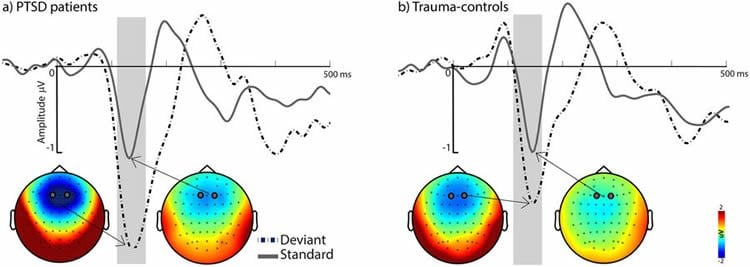Summary: In people with PTSD, the brain expresses an enhanced response to deviant tones, suggesting their brains over process any environmental changes. Additionally, researchers note, the more enhanced the response, the worse those with PTSD performed on cognitive and memory tests.
Source: University of Birmingham.
Scientists at the Universities of Birmingham and Amsterdam hope to have found a new neurobiological marker to help recognise patients with post-traumatic stress disorder (PTSD).
Using an electroencephalogram (EEG) – a test that detects electrical activity in a person’s brain via electrodes attached to their scalp – researchers studied the brain activity of a group of thirteen patients with PTSD. The group was then compared to a group who had suffered a similar trauma but had not gone on to develop PDST.
PTSD is estimated to affect about one in every ten people who have a traumatic experience. It can develop immediately after someone experiences a disturbing event or it can occur weeks, months or even years later and can affect a person’s memory.
The type of events that can cause PTSD include serious road accidents, violent personal assaults, witnessing violent deaths, military combat, being held hostage, terrorist attacks and natural disasters.
Dr Ali Mazaheri, of the University of Birmingham’s School of Psychology and Centre for Human Brain Health, said of the study published today in Nature Scientific Reports: “We know that a symptom of PTSD can be heightened sensory sensitivity.
“In this study, we tested the brain’s response to a simple auditory sensory change by playing simple (standard 1000Hz) tones every second, and then intermittently playing a slightly altered tone (1200 Hz), known as a deviant.
“What we found was that patients who had developed PTSD showed enhanced brain responses to deviant tones, suggesting their brain over-processed any change in the environment.
“Importantly we found the more enhanced their response was, the more poorly they performed on cognitive tests looking at memory.”
Katrin Bangel, of the University of Amsterdam, said: “This is the first research study of its kind. The neurobiological evidence we now have shows how altered brain activity of a patient with PTSD is closely related to the way it processes the world.
“What’s more, this study is very unique in that it compared PTSD patients with a control group of those that also suffered similar trauma but didn’t develop PTSD, rather than a control group who had no trauma or PTSD – this really allows us to look at what triggers PTSD following significant trauma.
“We now potentially have a new neurobiological marker for PTSD patients that maps to their own individual symptoms.
“This marker, if validated, could be used to assess if an individual is getting better with treatment. It can also be potentially used in diagnosing patients.”
Dr Miranda Olff, of the University of Amsterdam and Arq Psychotrauma Expert Group, said: “This area of research is incredibly important.
“Post-traumatic stress disorder (PTSD) is a debilitating disorder caused by very stressful, frightening or distressing events.
“Someone with PTSD often relives the traumatic event through nightmares and flashbacks, and may experience feelings of isolation, irritability and guilt.

“They may also have problems sleeping, such as insomnia, and find concentrating difficult.
“These symptoms are often severe and persistent enough to have a significant impact on the person’s day-to-day life.
“Therefore it is vital that we find new ways to treat the condition and also assess treatment outcomes.”
The team has now begun further research validating the marker and also plans a clinical trial to test potential treatments on patients with PTSD.
Source: University of Birmingham
Publisher: Organized by NeuroscienceNews.com.
Image Source: NeuroscienceNews.com image is credited to Olff et al./Scientific Reports.
Original Research: Full open access research for “Aberrant brain response after auditory deviance in PTSD compared to trauma controls: An EEG study” by Katrin A. Bangel, Susanne van Buschbach, Dirk J. A. Smit, Ali Mazaheri & Miranda Olff in Scientific Reports. Published online November 29 2017 doi:10.1038/s41598-017-16669-8
[cbtabs][cbtab title=”MLA”]University of Birmingham “People With PTSD React Differently to Certain Sounds.” NeuroscienceNews. NeuroscienceNews, 30 November 2017.
<https://neurosciencenews.com/sound-ptsd-8069/>.[/cbtab][cbtab title=”APA”]University of Birmingham (2017, November 30). People With PTSD React Differently to Certain Sounds. NeuroscienceNews. Retrieved November 30, 2017 from https://neurosciencenews.com/sound-ptsd-8069/[/cbtab][cbtab title=”Chicago”]University of Birmingham “People With PTSD React Differently to Certain Sounds.” https://neurosciencenews.com/sound-ptsd-8069/ (accessed November 30, 2017).[/cbtab][/cbtabs]
Abstract
Aberrant brain response after auditory deviance in PTSD compared to trauma controls: An EEG study
Part of the symptomatology of post-traumatic stress disorder (PTSD) are alterations in arousal and reactivity which could be related to a maladaptive increase in the automated sensory change detection system of the brain. In the current EEG study we investigated whether the brain’s response to a simple auditory sensory change was altered in patients with PTSD relative to trauma-exposed matched controls who did not develop the disorder. Thirteen male PTSD patients and trauma-exposed controls matched for age and educational level were presented with regular auditory pure tones (1000 Hz, 200 ms duration), with 11% of the tones deviating in both duration (50 ms) and frequency (1200 Hz) while watching a silent movie. Relative to the controls, patients who had developed PTSD showed enhanced mismatch negativity (MMN), increased theta power (5–7 Hz), and stronger suppression of upper alpha activity (13–15 Hz) after deviant vs. standard tones. Behaviourally, the alpha suppression in PTSD correlated with decreased spatial working memory performance suggesting it might reflect enhanced stimulus-feature representations in auditory memory. These results taken together suggest that PTSD patients and trauma-exposed controls can be distinguished by enhanced involuntary attention to changes in sensory patterns.
“Aberrant brain response after auditory deviance in PTSD compared to trauma controls: An EEG study” by Katrin A. Bangel, Susanne van Buschbach, Dirk J. A. Smit, Ali Mazaheri & Miranda Olff in Scientific Reports. Published online November 29 2017 doi:10.1038/s41598-017-16669-8






